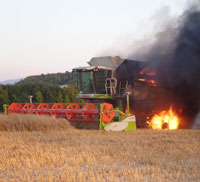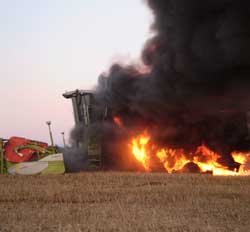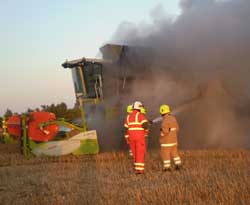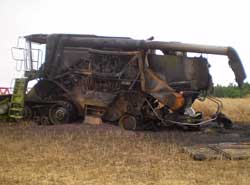Northern and Scottish Barometers scorch through harvest

Mike Eagers
Harvest was all but over for Scottish Barometer Mike Eagers, despite a fire that destroyed the farm’s Class Lexion 600 Terra Trac.
“It caught alight cutting oilseed rape on a Sunday evening and by the time the driver realised what was happening it was too late. It’s a complete write-off and it took 5t oilseed rape with it.”
But the following morning Claas had a replacement Lexion 570 ready to go, he said. “Claas were fantastic and looked after us very well. In the end, we lost very little time. We dragged the burnt out combine to the edge of the field where it still stands.”
Since then progress had been good and just 122ha of winter and spring wheat was left to cut when the weather broke on Tuesday morning (7 September). “We got some in below 15% moisture, which we haven’t dried, but most came in between 16-17%. We gave this a quick blast through the drier and it’s ready to go.”
| Mike Eagers’ Lexion 600TT burnt out, but he managed to save the header – so that a replacement machine could swing into action as soon as it arrived – and the crop. |
 |
 |
 |
A lack of storage was the main hold up at Trinlaymire Farm, Linlithgow, as Mr Eagers had anticipated a much later harvest. “Usually we’re not into wheat until the second week of September so I contracted to sell 1600t then to free up some space. As we are so much earlier, we’ve had to do a lot of juggling to get it in.”
Wheat yields were variable with crops on heavier ground giving significantly better performance, he said. “I haven’t had chance to work out exact yields yet as we’ve had such a fast run, but our average is slightly down at 8t/ha.” Roughly 60% of the wheat was sold forward at about £120/t and all barley had been sold for £130/t or more, he added.
The farm’s prime mover had been working 24 hours a day for the past six weeks and had already established the entire 250ha of oilseed rape and all 113ha of first wheats. “We’re now moving on to barley and second wheats and hope to be finished by the end of the month.”
All rape had received a pre-emergence herbicide and graminicide, and pre-emergence herbicides had been applied to all first wheats.
“We’ve thrown a lot of labour at it this year and it appears to have paid off. In the past we have had to rely on spring cropping as the autumn window is so short, but this time we have just got a small area of spring wheat and barley which will be put in after farmyard manure.”
David Hall
Spring barley and spring oilseed rape were the only crops waiting to be cut on the Chipchase Estate on Tuesday (7 September), said northern Barometer David Hall.
Despite a dose of glyphosate 10 days ago, 100ha block of Tipple and Quench was still too green to combine. “It has taken some killing. It’s still green along the tramlines, under trees and where it has been double drilled, but if we get a dry spell this week we might get into it by the weekend.”
Heros spring oilseed rape was also green and due to be desiccated this week. “We’ve got 80 acres to do and I’ve going to use Reglone (diquat) instead of Roundup (glyphosate) so I can get into it quicker.”
A dry week meant wheat harvest was seen off in five consecutive days, with all Cordaile and Claire safely in store by 1 September. “It’s all waiting to go down to Tynegrain at the moment and we need to clear some shed space before we go into the spring barley.”
Cordiale returned the highest yields at 9.8t/ha, despite looking disappointing earlier in the season, he said. “When I saw it in the field I reduced this season’s seed order in favour of Claire, but as soon as the combines started rolling I quickly reversed it.”
Claire on lighter ground was disappointing returning 6.8t/ha and bringing the farm average down to 8.6t/ha. “I think it was probably more to do with the ground than the variety as the Cordiale was mainly on heavier ground with better moisture retention.
“It’s been a pretty average harvest, but about what we budgeted for at our year end in June. However, one thing we didn’t bargain for was the price, which is a nice surprise.”
Oilseed rape yields fell just below the farm’s five-year mean at 3.4t/ha. Excalibur outperformed Castille’s 3t/ha average giving 3.7t/ha, said Mr Hall. “The Castille was planted on lighter ground and it rained just after we treated it with Butisan (metazachlor), meaning we had significant poppy problems.”
Wheat drilling started on Tuesday (7 September) with Claire after oilseed rape. “Were doing a 50/50 split with Cordiale and Claire this season because they’re both consistent performers. Claire is early to drill and Cordiale is one of the earliest to harvest.”
• For more on Mike Eagers and David Hall visit our Barometer farmer web page

